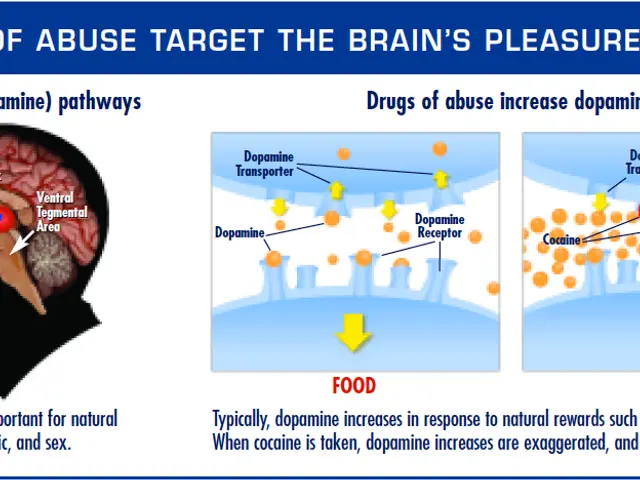Unmasking Brain Fog Caused by Vitamin B12 Deficiency: Crucial Information and Remedies
Vitamin B12, an essential nutrient for neurological function, plays a crucial role in supporting neurotransmitter production, myelin sheath maintenance, and overall brain structure integrity. However, a deficiency in this vital vitamin can lead to serious and potentially permanent long-term effects on cognitive health, particularly brain fog and memory problems.
Untreated vitamin B12 deficiency can cause persistent brain fog, memory problems, cognitive decline, dementia-like symptoms, mood changes, and mental health issues. The underlying mechanism involves reduced oxygen delivery to the brain due to decreased red blood cell production and disruption of biochemical pathways essential for nerve and brain health.
Persistent brain fog and memory problems occur when the deficiency damages the hippocampus, the brain region critical for memory and learning. Severe or prolonged deficiency may mimic or increase risks of dementia and Alzheimer’s disease, causing notable cognitive impairment, disorientation, and difficulty reasoning, especially in older adults.
Mood changes and mental health issues, such as irritability, depression, and anxiety, are also linked to vitamin B12 deficiency. This is partly due to disrupted neurotransmitter synthesis and elevated homocysteine levels, which can negatively affect brain function. Untreated deficiency can also cause permanent nerve damage, which may manifest as numbness, tingling, and difficulty walking.
Early diagnosis and treatment are essential to prevent these permanent neurological consequences. Regular blood tests can effectively determine B12 levels and help manage deficiencies before cognitive symptoms develop. For severe deficiencies, intramuscular injections offer rapid restoration, while moderate deficiencies or those preferring oral options can opt for high-dose B12 supplementation (1,000-2,000 mcg daily).
Other factors that increase the risk of Vitamin B12 deficiency include autoimmune conditions, gastric disorders, certain medications, and vegetarian diets. Strict vegetarian diets lacking animal-derived dietary sources can create intake deficiencies, especially concerning for breastfed infants of B12-deficient mothers and individuals with limited access to fortified foods.
Cognitive recovery begins within days to weeks after starting B12 treatment. Regular exercise promotes better circulation, helping deliver absorbed nutrients throughout the body. Consuming B12-rich foods, managing stress, and reducing alcohol intake can enhance absorption and cognitive function. Genetic tests can identify variants affecting nutrient absorption pathways for B12.
In addition, maintaining good sleep hygiene supports metabolic processes, and stress management optimizes gut function, both of which are crucial for the proper absorption and utilization of vitamin B12. Regular B12 testing is recommended to adjust supplementation strategies as the body's needs evolve.
For those who find injections difficult, nasal spray supplementation offers a needle-free alternative. Subcutaneous administration provides an alternative administration route when intramuscular injections are contraindicated. Methylcobalamin benefits neural function directly as it crosses the blood-brain barrier.
It is important to note that untreated vitamin B12 deficiency can trigger significant psychiatric symptoms such as depression, anxiety, and psychosis. Proper diagnosis requires serum B12 testing, homocysteine, and MMA assessments, alongside thorough psychiatric screening.
In conclusion, regular B12 testing and early treatment are vital in preventing the long-term effects of vitamin B12 deficiency on cognitive health. Moderate alcohol consumption, stress management, and smoking cessation protect gastric lining integrity, crucial for intrinsic factor production. Maintaining good sleep hygiene and a balanced diet can further support the body's ability to absorb and utilize this essential nutrient.
- A deficiency in vitamin B12, an essential nutrient for neurological function, can lead to serious cognitive health issues such as brain fog, memory problems, cognitive decline, and dementia-like symptoms.
- Mood changes and mental health issues like irritability, depression, and anxiety can also be linked to vitamin B12 deficiency, due to disrupted neurotransmitter synthesis and elevated homocysteine levels.
- Persistent brain fog and memory problems can occur when the deficiency damages the hippocampus, the brain region critical for memory and learning.
- Severe or prolonged deficiency may mimic or increase risks of dementia and Alzheimer’s disease, causing notable cognitive impairment, disorientation, and difficulty reasoning.
- Permanent nerve damage, which may manifest as numbness, tingling, and difficulty walking, can also result from untreated vitamin B12 deficiency.
- Early diagnosis and treatment, through regular blood tests, B12 supplementation, or intramuscular injections, are essential to prevent these permanent neurological consequences and promote cognitive recovery.







